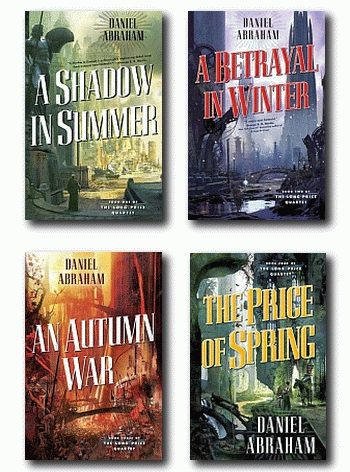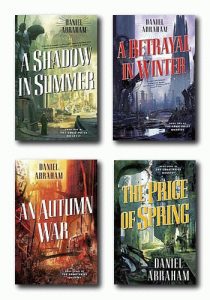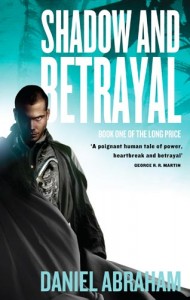Review: The Long Price Quartet
Let me preface this review by saying that I have been wanting to review this series since I started writing for Dorkadia. It is in a crazy skewed corner of the quality-to-popularity matrix among fantasy books, and that is a goddamn crime. Part of that, no doubt, is due to the same thing that delayed my review; a publishing snafu prevented the fourth book, The Price of Spring from coming out in mass-market paperback in the US. Now, a duology release has seen the series combined as Shadow and Betrayal and The Price of War, and you can buy the whole thing, and you should.
So the Long Price Quartet. It’s a series by Daniel Abraham, otherwise known as one-half of James S.A. Corey of The Expanse fame, set in a fantasy world informed largely by feudal Japan and Renaissance Europe. The main setting, the city-states of the Khaiem, is a nice breath of air for a market swamped by chainmail-and-broadswords occidental settings, and really sets the stage for the kind of series you’re going to read – something well within the trappings of modern fantasy lit, but in a lot of ways entirely different.
The Khaiem are the world’s greatest civilization, the inheritors of a fallen empire ten generations old, and they’ve carried on most of that empire’s traditions: the good (a peaceable culture with spectacular amounts of money), the bad (an intricate political system based around the idea of “setting brothers loose to murder each other to see who gets Dad’s job”) and the ugly (the andat). The andat are the reason the Khaiem have no standing army, and the reason for most of the events of the story. In short, they’re poems brought to life, concepts bound into a more or less human form and used to run the world.
I run the risk, trying to describe the whole idea, of failing to get across how friggin’ well done it is; as the quartet unfolds, a reader learns more and more about the poets (and isn’t that a neat way to classify wizards/sorcerers/magic-users?) and their living poems, and the mechanics of trying to cleverly turn a broad concept (like “Water-Moving-Down” or “Removing-The-Part-That-Continues”) into something that hasn’t been done before by some other poet. And all through their existence, the living poems are struggling to get free. Forcing a concept into a physical body is pretty rank bad hat, and the concepts, given will & volition, want no part of it.
So you have a powerful civilization founded on a scary, ill-understood, and inherently unsustainable magic. Their neighbors, meanwhile, are dicking around with standing armies and such, but they also have industry not dependent on summoning up a metaphor and strapping it to the plow. It’s a world full of intriguing, tasty conflicts, and one not dependent on fiddly little political details and name memorization to remain compelling. Reading the first book, A Shadow In Summer, I understood the issues and the stakes very quickly, and as the story spread out it didn’t just get broader; it got deeper.
And what a story it is. Summer concerns itself mostly with one particular city, the port town of Saraykeht, and a handful of Khaiem who find themselves there – an apprentice poet, a merchant administrator, her assistant, and a day laborer who is, of course, more than he appears. They quickly wind up getting entangled in a political scheme involving the local poet and, well, repeating plot details is a silly way to spend a review. The two main points I want to make about the storytelling are this: first, the story is told on an oddly intimate scale. There are nation-cracking events and world-spanning plots, but they center around small, personal fulcrums, even later in the series when we’re actually encountering some classic high-level fantasy politicking. Second, the pacing is absolutely fascinating. Each book is a decade or two further down the timeline, so you’re skipping in and out of these peoples’ lives as they age and mature. Again, it’s that kind of intimacy, getting to know the characters and get invested in them in a way that a lot of fantasy fails to capture.
And oh man, those characters. Where Mr. Abraham really nails it is the cast. The closest thing to a protagonist is Otah Machi, a Khai’s son (e.g., candidate for city-state rulership as long as he’s cool killing his brothers) who renounces his birthright at the beginning of the story. Otah is, in a lot of ways, a traditional fantasy protagonist, an independent, strong-willed guy who tries to do the right thing. In a lot of others, well, he’s just a guy, a human being who constantly fails, makes mistakes, is punished for standing up for his principles and rewarded for betraying them, and just about stumbles sideways into most of his successes. It’s a remarkable take on the character archetypes Otah inhabits. Other characters are similarly subtle and well-portrayed, in ways that are kinda hard to do justice to in this review when, again, so much is drawn from watching them develop and grow.
Really, what sets Long Price apart is the view it seems to espouse on how things happen. Fantasy fiction, a lot of the time, is concerned with the people who move and shake events, and lays those events at their doorstep. Heroes, villains, grey characters, whatever; people still turn the wheels. Daniel Abraham approaches the events of his series with a more modern take on history. It’s still tracking the people who will be written as heroes & villains, whose names would be in the textbooks of the Khaiate a few hundred years down the line, but posits that these are the beneficiaries of history, not its sole authors. Things happen for all sorts of reasons – geographical, socioeconomic, magical, and yeah, even personal – and these are the people who happen to be there to ride the tiger and hold on for dear life. It’s a very, very different experience to read a fantasy series that acknowledges that one man’s bold stand against darkness can be completely meaningless, or succeed for reasons that he did not expect or plan on.
So yeah. I really can’t recommend this series enough. The magic is fascinating and well-explained, the setting is neat and not drowning in world-building detail, the characters are compelling and believable, and the plot sticks ‘em all together and lets loose. Start with A Shadow In Summer (or the duology, Shadow and Betrayal), and let it grab you. It’s a series that needs a time time to unfold, but it’s well worth the investment.









These books are hugely underrated. Shame.